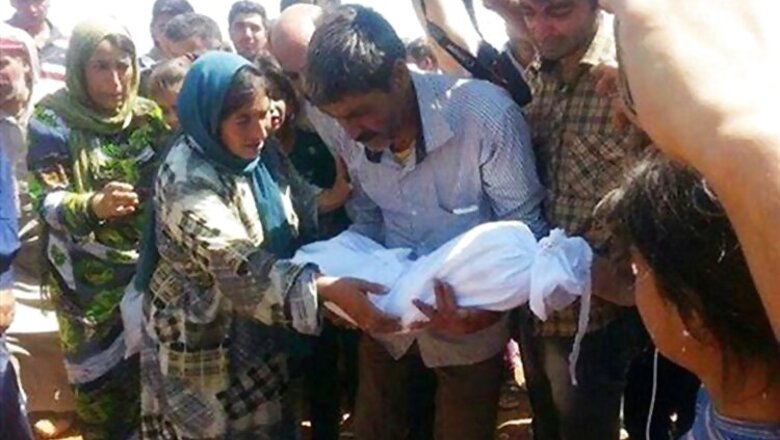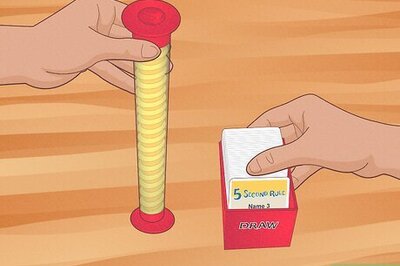
views
A Syrian father on Friday buried his wife and two little boys, drowned as they tried to flee to Europe, while hundreds of migrants fled from a detention camp and escaped a train stranded under police siege in Hungary.
Hungary's hardline leader said Europeans could end up a minority on their own continent as a crackdown appeared to crumble in his own country, main entry point for tens of thousands of refugees and migrants reaching the EU by land over the Balkan peninsula.
Hungary has cancelled all trains to western Europe to prevent migrants from travelling on and seeking sanctuary in richer countries north and west. Its prime minister, Viktor Orban, says he is enforcing EU rules by forcing all migrants into camps to register, rather than let them proceed on to other countries.
But hundreds escaped on Friday from a camp near the southern border and later clashed with police there. Hundreds more fled from a train that had been halted west the capital Budapest. Others crossed police barricades to set off on foot from the capital's train station, heading west for the distant border led by a Syrian refugee with one leg.
In neighbouring Austria, police said the driver of a truck found abandoned last week with the bodies of 71 migrants in the back was among a group of people arrested in Hungary, and gave new details about their deaths. Dozens more had narrowly avoided death by using a crowbar to escape from another truck owned by the same Bulgarian man, they said.
More than 300,000 people have crossed to Europe by sea so far this year and more than 2,600 have died doing so. Many of those making the voyage are refugees from the civil war in Syria, now in its fifth year.
More deaths at sea were reported on Friday. About 30-40 people drowned in the Mediterranean off the coast of Libya after a dinghy carrying 120-140 Somalis, Sudanese and Nigerians deflated, causing panic on board, the International Organisation for Migration said.
In the Syrian town of Kobani, 3-year-old Aylan Kurdi was laid to rest alongside his mother and 5-year-old brother at the "Martyr's Cemetery" in the predominantly Kurdish community near the Turkish border.
Images of Aylan's tiny body washed up on a beach near the Turkish resort of Bodrum gave a human face to the casualties and prompted a global outpouring of sympathy this week. He drowned with his brother Galip, his mother and at least nine others while trying to cross in two small boats to the Greek island of Kos just a few kilometres away.
While pressure is rising on European governments to tackle the crisis more effectively, the boys' weeping father, Abdullah Kurdi, called on countries closer to home to act.
"I want Arab governments - not European countries - to see (what happened to) my children, and because of them to help people," he said in footage posted online by a local radio station.
The head of the United Nations' refugee agency, Antonio Guterres, called on Friday for the European Union to mobilise its "full force" to help the migrants.
The crisis has divided the 28-member EU, with countries that have accepted large numbers of migrants, led by Germany, which is planning for 800,000 asylum seekers this year, accusing those who have accepted few of shirking their moral duty.
Countries that have kept their doors more tightly shut say too big a welcome would make the problem worse by encouraging more people to make the journey. But this week's scenes, especially the photos of Aylan on the beach, may prompt relative hardliners like Britain's David Cameron to give way.
Senior EU officials said European Commission President Jean-Claude Juncker, who failed earlier this year to persuade the bloc's leaders to agree to a system to share 40,000 Syrian refugees, would try next week to convince them to take 160,000.
U.S. presidential candidate Hillary Clinton called for a global response: "The entire world has to come together. It should not be just one or two countries, or not just Europe and the United States," Clinton told MSNBC.
Air for only 90 minutes
In Austria, police said the 71 dead migrants found alongside a motorway near the Hungarian border last week were Syrians, Iraqis and Afghans, but none had been identified. They included a baby girl, her brother, two other children and eight women.
There was enough air inside the truck for no more than 90 minutes and the people appeared to have slowly lost consciousness, suffocating before they crossed from Hungary.
In southern Hungary, police gave chase as about 300 migrants fled the crowded reception centre in Roszke on the border with Serbia. Another 2,300 migrants still inside were threatening to break out too. After the escapees were returned to the camp, migrants stormed barricades and clashed with police.
Hungary's MTI news agency said hundreds of others had escaped from a train that had been halted west of Budapest in the town of Bicske, where riot police had failed since Thursday to force them to go to a registration camp.
"No camp. No Hungary. Freedom train,” someone had written with shaving foam on the side of the train.
Hungary blames the chaos on Germany, which has said it will let Syrians register for asylum regardless of where they entered the EU, suspending normal EU rules.
Prime Minister Orban, emerging as one of the continent's most outspoken opponents of large-scale migration, took to the airwaves to warn of dire consequences if the influx was not checked.
"Now we talk about hundreds of thousands but next year we will talk about millions and there is no end to this," he said. "All of a sudden we will see that we are in a minority in our own continent."
Back in Turkey, only a few days after Aylan Kurdi and his family set off on their fatal voyage, more Syrian refugees were planning the same crossing to the Greek island of Kos.
"We saw the picture of the baby, (but) we have no other chance," said 36-year old Abdulmenem Alsatouf, a father of three who once ran a supermarket in the Syrian city of Idlib.



















Comments
0 comment